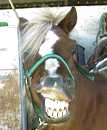Care of the Horse's Teeth
A good horse owner will check his horse's teeth once a year or
more. It's especially important to examine the teeth when the
horse keeps turning his head, slobbing, or tugging at the bit,
indications of teeth problems. It is advisable to remove the wolf
teeth, which are small teeth that are found on the upper jaw in
front of the premolars. These teeth are difficult to see, but are
felt easily. Place your thumb on the gums of the bars of the
mouth. Run your thumb back toward the premolars.
If a horse has wolf teeth you should feel a sharp, small,
pointed tooth just before your thumb touches the side of the premolar.
Wolf teeth are easily removed because they have shallow roots.
It has been estimated that 60 to 80 percent of all male horses have wolf
teeth whereas only 20 to 30 percent of all female horses have
wolf teeth. Wolf teeth are the first thing to check for if your
horse has biting problems. Many farms routinely remove wolf teeth
from young horses before they go into training.
Most of the horse's tooth care involves floating of the premolars
and molars. The upper jaw is approximately 30 percent wider than
the lower jaw. Consequently, the molars wear unevenly with time.
The upper molars will develop points on the outside and the lower
molars will develop points on the inside.

It is a theory that mastication (chewing) of feed is affected
and therefore digestibility of feed is reduced. Horses that drop large
quantities of feed from their mouth when eating may be candidates
for floating. Floating involves the use of floats (rasp-like
tools with handles) to file or remove the points that have
developed on the molars. If not filed, the sharp points may cause
discomfort by cutting the inside of the cheeks when the horse
chews or is ridden with a bit.
At times horses have infected teeth that will need removal but,
fortunately, this is rare. An abscessed tooth will emit a foul
smell and generally cause swelling that can be observed on the
horse's face. In addition, there may be a nasal discharge that is
unrelated to a respiratory disease. An inexperienced horse owner
should ask a veterinarian to look at the teeth when the horse is
being treated for other ailments or when a problem is suspected.